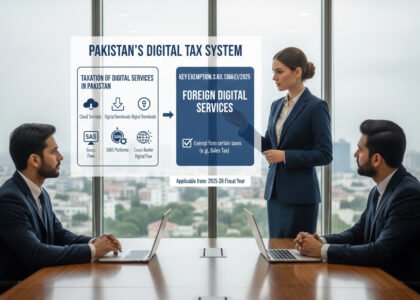SRO 1366(I)/2025 — Complete Guide to the Exemption on Digital Presence Proceeds Tax (With Practical Examples)
On 10 July 2025, the Federal Board of Revenue (FBR) issued SRO 1366(I)/2025 under Section


On 10 July 2025, the Federal Board of Revenue (FBR) issued SRO 1366(I)/2025 under Section

Pakistan’s digital economy has grown rapidly, and more individuals now earn through freelancing, YouTube, software


Pakistan’s Active Taxpayers List Hits Record 4.6 Million: FBR’s Push for Tax Compliance In a

Clarifying the Taxation of Foreign Income Understanding the Tax Landscape for Pakistani Residents Reference: Income